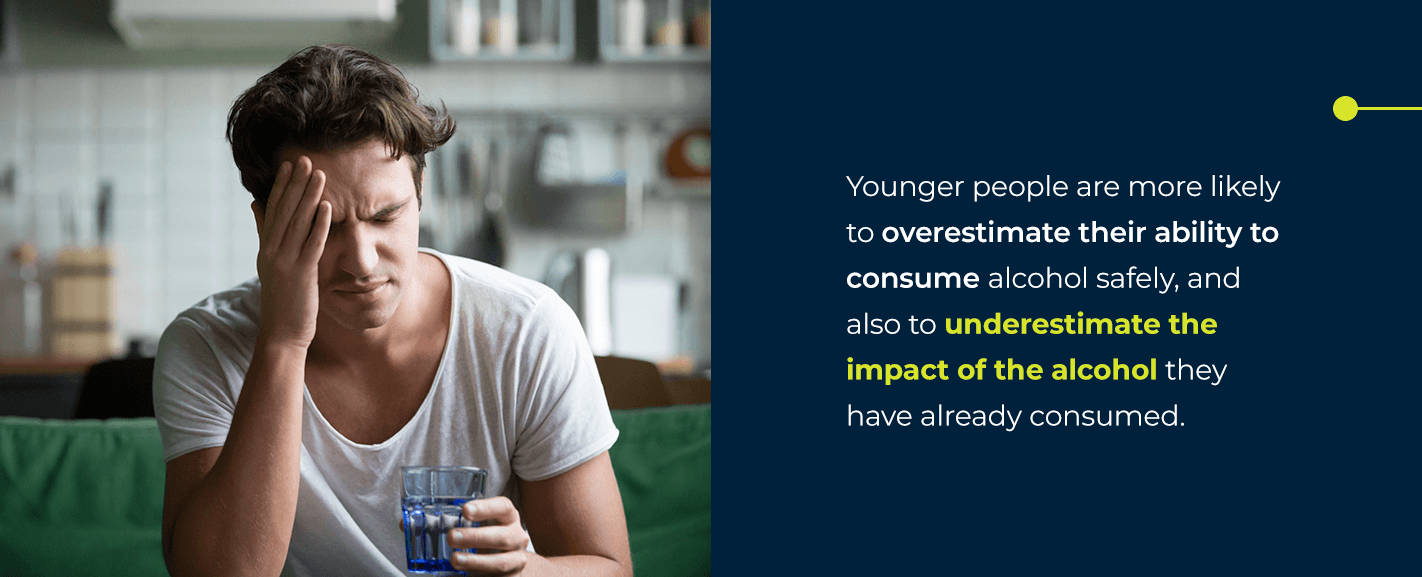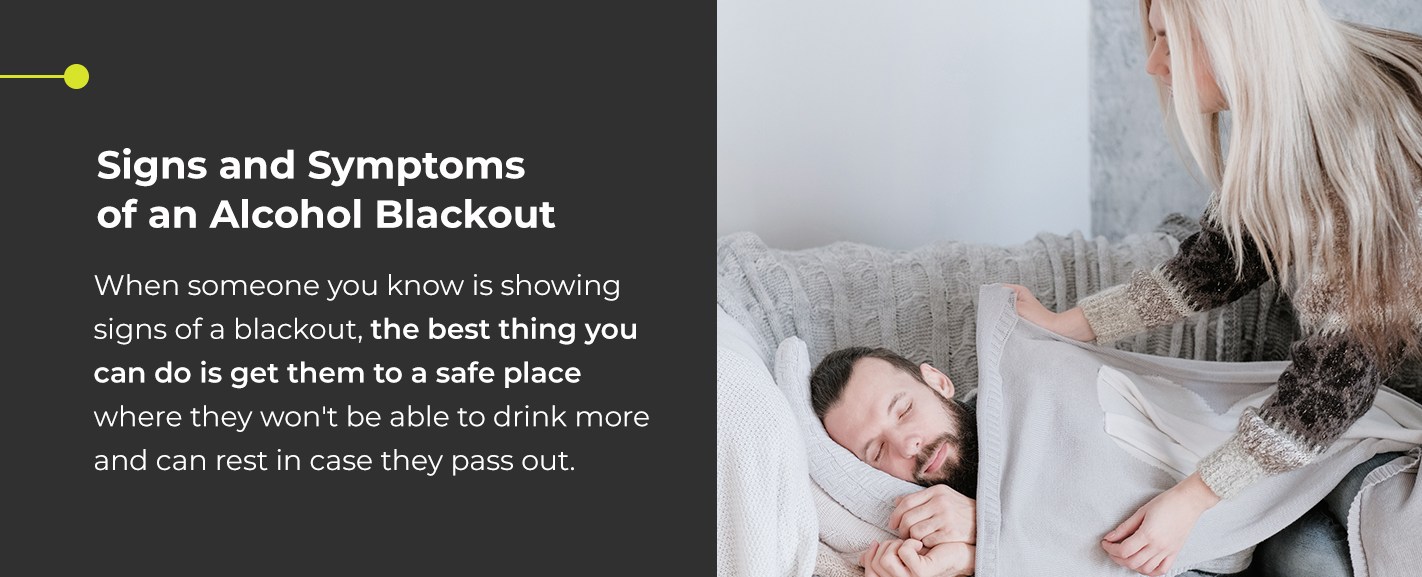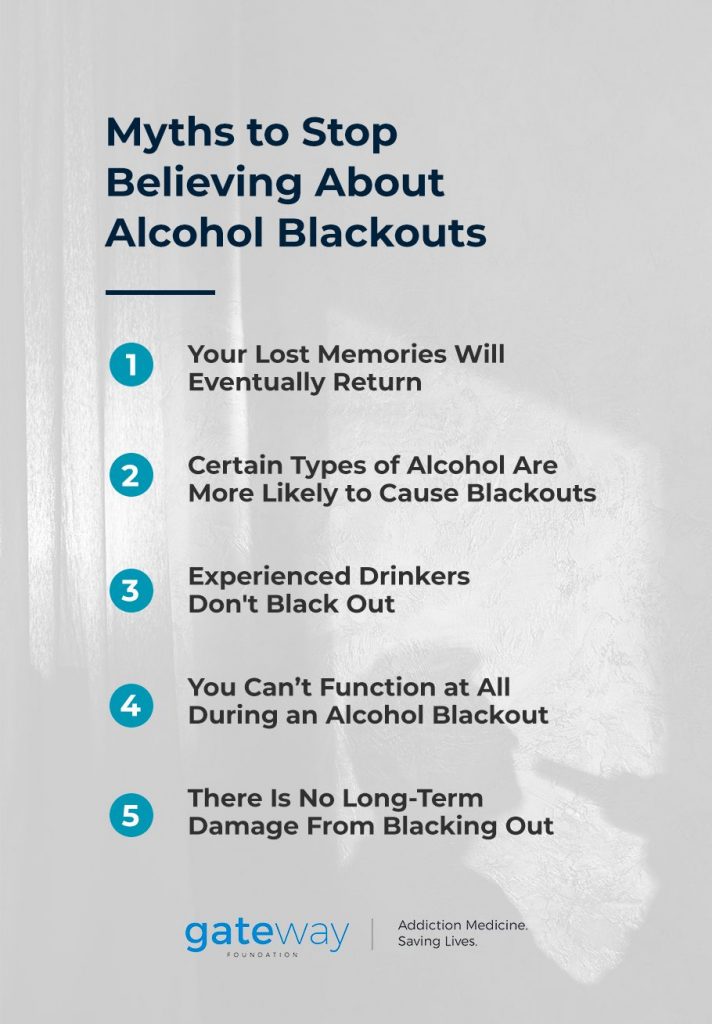- May 8
- Drug Addiction Treatment
About 26 percent of Americans 18 and older have engaged in binge drinking in the past month. Alcohol blackouts are poorly understood by most people because they don’t recognize the risks they or their friends face when they get blackout drunk.
In this guide, we’ll explain what is a blackout, what symptoms to look for, and what the risks of alcohol-induced blackouts are.
- What Is an Alcohol Blackout?
- Who Is at Risk for an Alcohol Blackout?
- Symptoms Associated With Different Levels of Intoxication
- Signs and Symptoms of an Alcohol Blackout
- What to Do When Someone Is Too Drunk
- Short-Term and Long-Term Effects of Blackouts
- How to Recover From a Blackout
- Myths to Stop Believing About Alcohol Blackouts
- Is Blacking Out a Sign of Addiction?
What Is an Alcohol Blackout?
The term “blackout” refers to the loss of memory caused by a fast spike in blood alcohol level (BAC). It may also be referred to as “alcohol-induced amnesia.” Want to know what causes a drunk blackout? Binge drinking, which rapidly raises BAC, is what causes alcoholic blackouts. A high BAC makes it difficult for the brain to form new memories, leading to long periods of time in which someone is drinking and not remembering what they are doing or what is happening around them.
Not everyone reacts to alcohol the same, but usually, someone’s BAC must reach about 0.14 percent for a blackout to begin — that’s almost twice the legal limit for driving. Without the influence of alcohol, the brain processes sensory input through transfer encoding, forming short-term memories. It then does the same to convert short-term memories to long-term memories, which are then stored for later retrieval. Alcohol interferes with the conversion of short-to-long-term memories, as well as retrieval from long-term storage. There are two types of blackouts from drinking:
- En block or complete blackouts induce complete memory loss until the person’s BAC lowers enough for memory processing to start working again.
- Partial or fragmentary blackouts may involve the person forgetting what has happened recently, but being able to retrieve some memories with the right cues.
A blackout from drinking is far different from passing out, although people tend to confuse the two. A person who is blackout drunk is still conscious and making decisions. They may even appear to hold conversations, even if they experience memory loss when drinking.
Who Is at Risk for an Alcohol Blackout?
While anyone who drinks is at risk for alcohol blackouts, there are some factors that put people in greater danger of drinking and not remembering things. Women’s hormones and body composition mean they become intoxicated with less alcohol than men, which is why the definition of binge drinking differs between men and women. Because women’s BAC rises faster, they are at greater risk for blackouts.

Symptoms Associated With Different Levels of Intoxication
As BAC rises, observers will be able to track a person’s level of intoxication and recognize alcohol blackout symptoms at higher levels. The following guidelines will help you estimate BAC based on behavior:
- BAC below 0.06: The person might not notice any real effect, or may experience slight mood shifts like relaxation or sleepiness. Their reflexes and coordination may also suffer slightly.
- BAC 0.07 to 0.09: The person becomes more talkative and may experience some euphoria along with reduced inhibitions. This is the range in which people are considered legally drunk and cannot drive.
- BAC 0.09 to 0.15: Coordination and reaction times are significantly slower, and the person might stumble or slur their speech.
- BAC 0.16 to 0.30: Severe impairment occurs in this range. A person’s judgment may become markedly worse, and they may not be able to understand the consequences of their actions. Vomiting and blackouts may occur, and the person is at risk of getting alcohol poisoning.
- BAC 0.30 to 0.39: A person can’t function properly and is likely in a confused stupor. They may pass out abruptly and unintentionally, and likely have alcohol poisoning.
- BAC 0.40 to 0.50 and up: In this range, the body comes close to shutting down and may even go into a coma. The person may stop breathing, and the heart may fail. Emergency medical assistance is required.
While the above guidelines are accurate for most people, there are multiple factors that influence BAC. The more someone drinks, the higher their BAC will rise, but some variables may cause BAC to rise faster or slower. Women and those with more fatty tissue will see faster BAC increases. Shorter or smaller-framed people will also experience more rapid rises in BAC. Other factors to account for include:
- The rate at which the person drinks.
- Whether or not they drink on an empty stomach.
- The strength of the drink they consume.
- Whether or not they are using other drugs, legally prescribed or otherwise.
- How fast their body can metabolize alcohol.
A standard drink — that’s 1.5 oz of hard liquor, 5 oz of wine or 12 oz of beer — will elevate the average person’s BAC by around 0.06 per drink. They will clearly display signs of intoxication as they continue to consume alcohol. Someone with an alcohol addiction, on the other hand, has a much higher tolerance and may be able to continue drinking without displaying many notable signs of intoxication because their brain is used to the presence of alcohol.
However, they are still as susceptible to blackouts if they keep on drinking. They may go from not appearing very drunk to suddenly blacking out.
Signs and Symptoms of an Alcohol Blackout
Blackouts can be difficult to identify, as the person may be fully capable of engaging in regular behaviors. They may go on having conversations, eating and, in many cases, continuing to drink. This makes blackouts more common than most people realize. Wondering what happens when you are blackout drunk? Looking for indicators of how to tell if someone is blackout drunk? Look for alcohol blackout symptoms, including:
- Being easily distracted.
- Constantly forgetting what one has just said, what one was talking about or what one was just doing.
- Repeating the same sentences or questions over and over again without appearing to remember that they are repeating themselves.
- Being unaware of or confused by one’s surroundings.
- Lacking concern for the thoughts and feelings of others.
- Engaging in unusually risky behaviors.
- Consuming large quantities of alcohol over a short time period.
If you are concerned about experiencing a blackout from drinking yourself, keep the following measures in mind:
- Never drink on an empty stomach, which can rapidly raise your BAC to dangerous levels.
- Do not mix alcohol with any other substances, like medication or drugs.
- Opt for beer or wine and drink at a measured pace, rather than rapidly taking shots.
- Do not drink alone with people you don’t know — take a friend with you just in case.
- Drink water regularly to dilute the alcohol.
What to Do When Someone Is Too Drunk
When someone you know is showing signs of a blackout, the best thing you can do is get them to a safe place where they won’t be able to drink more and can rest in case they pass out. You may need to take more extreme action if they are displaying other signs of extreme intoxication, such as:
- Falling down
- Vomiting
- Seizures
- Inability to communicate
- Clammy skin or low body temperature
- Slowing heart rate
At the first sign of these symptoms, take them to an emergency room for immediate treatment or call 911 if you were also drinking. While waiting for help to arrive, keep them conscious for as long as possible. If they’re able, try to get them to sip on water to keep them hydrated. If they pass out, lay them on their side. This position will prevent choking if they vomit.
Be prepared to give medical professionals any information you know about the person who needs help. Try to figure out what they’ve been drinking and how much they’ve consumed. You may be worried about getting them in trouble, but any information you share can be life-saving, so don’t omit any details that could help emergency responders provide care.
Short-Term and Long-Term Effects of Blackouts
Blackouts themselves do not necessarily have physical impacts in the short term. Rather, the amount of alcohol necessary to induce memory loss when drinking leads to risky behavior that can have significant consequences. Run-ins w
Blackouts themselves do not necessarily have physical impacts in the short term. Rather, the amount of alcohol necessary to induce memory loss when drinking leads to risky behavior that can have significant consequences. Run-ins with the law, as well as poor decisions regarding finances or sexual activity, are often immediate consequences of blacking out from drinking.
Psychologically, blackouts can result in feelings of depression or anxiety regarding alcohol use and lost memories. As long as excessive drinking continues, these immediate symptoms may extend into chronic mental health conditions.
In the long term, alcohol consumption at levels high enough to induce blackouts will cause significant damage to the brain, including the centers that form, store and retrieve new memories. This level of consumption kills brain cells and may result in nerve damage, in addition to the long list of physical damage done by chronic alcohol use.
How to Recover From a Blackout
The day after blacking out from alcohol can be confusing and overwhelming. The person will likely wake up in a place they have no recollection of getting to and feel ill. When you or someone else comes around from a blackout, try these things to help them readjust:
- Treat the hangover: The body needs time to recover after a night of heavy drinking. Start with plenty of water, a hearty breakfast and some pain medication, if necessary.
- Figure out what happened: If you were with the person who blacked out, you can fill them in. Otherwise, you may need to ask around. Know that it’s not always possible to uncover what’s happened.
- Talk about getting help: Someone who blacked out due to experience with alcohol may need to consider limits for the future. However, if this is a common occurrence, it may be time to reach out for help treating the addiction.
Myths to Stop Believing About Alcohol Blackouts
Blackouts may be common in settings where people consume a great deal of alcohol, but there are still many misconceptions that people have surrounding the topic. Here are five myths you should know about alcohol blackouts:
1. Your Lost Memories Will Eventually Return
Many people believe it just takes the right type of cajoling to coax back memories lost when blackout drunk. This isn’t true in the case of an en block blackout. The hippocampus, responsible for forming long-term memories, shuts down entirely due to the chemical disruption from alcohol.
The amount of information that makes it through to the hippocampus is reduced, and the neurons needed to form memories are shut down. Expecting memories of a complete blackout to return is like expecting to hear a message playback when you never pressed “record.”
2. Certain Types of Alcohol Are More Likely to Cause Blackouts
There are plenty of phrases out there that suggest the type of alcohol a person consumes is responsible for their experience and likelihood of a blackout. Some types of alcohol are associated with wilder behavior, such as tequila. Some people insist that certain brands get them more drunk more quickly than others. In reality, the only thing that influences blackouts is BAC.
3. Experienced Drinkers Don’t Black Out
When someone blacks out in a social setting, they are often made fun of for being “a lightweight” and not being able to handle their booze properly. However, anyone who drinks fast enough will blackout no matter how well they can “hold their liquor.” While an inexperienced drinker may display more outward signs of intoxication, someone with a high tolerance can reach exceptionally high BAC levels and walk around blackout drunk without it being as obvious.
4. You Can’t Function at All During an Alcohol Blackout
Blacking out is not passing out. They do sometimes occur in conjunction, but for the most part, people who are experiencing a blackout can still move around and may generally act like they’re having a great time. However, their judgment and decision-making are severely impaired even if they don’t realize it, making it difficult to convince the person not to engage in risky behavior.
5. There Is No Long-Term Damage From Blacking Out
Blackouts may not cause direct harm, but the amount of drinking you have to do to become blackout drunk has serious consequences — especially over time. The more times you blackout, the more times you are impairing your balance, motor skills, impulse control and decision-making to the point where you may do something dangerous or self-injurious.
Is Blacking Out a Sign of Addiction?
Blackouts can occur in people who don’t fit the criteria for an alcohol use disorder (AUD). In fact, it may be easier for someone who doesn’t usually drink much to get blackout drunk, as those with a higher alcohol tolerance typically have to drink more to create this state. Once blackouts become frequent, they do become an indicator of addiction if they occur alongside other symptoms of alcohol addiction, including:
- Not being able to control how much you drink.
- Wanting or trying to cut down on the amount but being unsuccessful in your attempts.
- Spending increasing amounts of time thinking about alcohol, drinking, purchasing alcohol and recovering from alcohol use.
- Struggling with strong cravings and urges to drink.
- Falling behind or failing to fulfill normal obligations at work, school or at home due to alcohol use.
- Continuing to drink despite knowledge of the social, physical and psychological problems it is causing.
- Withdrawing from or reducing hobbies and activities you used to enjoy.
- Isolating yourself from friends and family in favor of drinking, or so you can avoid explaining your drinking.
- Developing a tolerance for alcohol, so that you need to drink more to feel the desired effect.
- Drinking in inappropriate, dangerous situations such as before driving or swimming.
- Experiencing withdrawal symptoms like shaking, sweating and nausea when you don’t or can’t drink.

Gateway Foundation is an alcohol addiction treatment center in Illinois, dedicated to helping people of all backgrounds learn to live life without drinking. We understand that every person arrives at addiction differently, and so we treat each individual according to their unique needs and circumstances. With a personalized treatment, you or someone you care about can take the necessary steps to understand and overcome alcohol addiction through residential, partial hospitalization or outpatient programs, depending on your needs.
Accepting that alcohol addiction is a problem in your life is the first step to beginning a healthy and happy life in recovery. The next step is to Call Gateway today at 877.505.4673 or contact us online to learn more about how our addiction medicine experts can help you get started on the path to health and sobriety.




